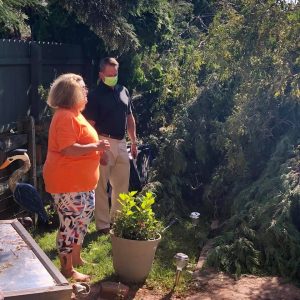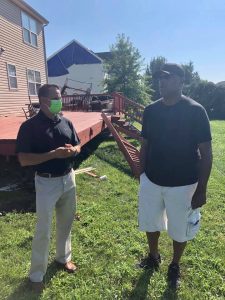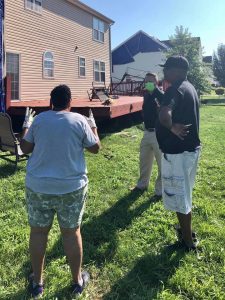Commissioner Navarro encourages caution in repairs, meets with community
Tropical Storm Isaias produced tornado activity, heavy rain and flooding, hail, and strong winds throughout the state, causing significant destruction in several Delaware communities. Insurance Commissioner Trinidad Navarro visited residents and assessed damage on Wednesday.
“While measuring the full extent of this storm will take time, we know one thing – we must come together as a community and support those that need to rebuild,” said Commissioner Navarro after touring Amberwood community in Bear, which saw extensive storm impacts, and speaking with those beginning the insurance claims process. “I understand the eagerness of every resident to clean up and make repairs, but I can’t emphasize enough the importance of contacting your insurance company first. Take photos of everything and do not make permanent repairs before working with your insurance adjuster. Make only necessary, temporary repairs to prevent additional damage. Save all documentation, pictures, and receipts.”

The Delaware Department of Insurance Consumer Services Division is working with residents who have questions or concerns about their insurance company’s actions, and can be reached at (800) 282-8611 or (302) 674-6227, or by email at consumer@delaware.gov.
Underscoring the importance of proceeding through the insurance claim and property repair process with caution, Commissioner Navarro highlighted the frequency of fraudulent activity after a storm: “Anytime we experience a big storm like Isaias, we see storm-chasing scammers pop up in neighborhoods, falsely stating they are with an insurance company, or encouraging homeowners to sign on to repair contracts without going through the proper channels – often price gouging residents, or completing shoddy repairs if they make any at all, leaving the consumer on the hook for costs that could have been covered by an insurer.”
Residents who encounter a storm-related insurance scam can contact the Fraud Prevention Bureau at (800) 632-5154 or (302) 674-7350, or email fraud@delaware.gov. Consumers are urged to carefully review contracts for home repairs, ask for references and research companies through the Better Business Bureau.
Consumers may contact the Delaware Emergency Management Agency, DEMA, to see what assistance may be available as a result of the Governor’s State of Emergency. Property insurance policyholders should be aware of the dwelling deductible stated on their insurance declaration page, and take note that there may be a deductible for named storms, wind, hail, or tornadoes that may apply to the claim, most often stated as a percentage of dwelling coverage.
Due to COVID-19 precautions, Department of Insurance offices are not currently open to the public, but residents are encouraged to contact the department at one of the emails or phone numbers above, or call (302) 674-7300 for assistance.

